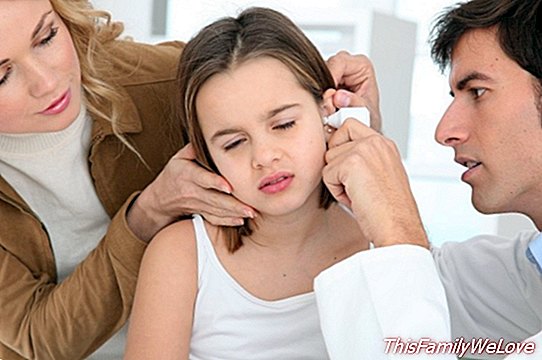Childhood otitis media and resistance to antibiotics

The cold and the rains multiply the cases of otitis media in children due to the risk of colds, a condition that is the most frequent cause of visits to the otolaryngologist in infants and children under 5 years of age. Currently, the excessive use of antibiotics has caused an increase in the resistance to the antimicrobials that are commonly used.
The babies and young children are more likely that adults to suffer acute otitis media (AOM) because their physiognomy is different from that of adults. In fact, 90% of the child population suffers at least one episode of otitis before the age of five, according to data from the Spanish Society of Otolaryngology and Head and Neck Surgery (SEORL-CCC).
And is that according to Dr. Javier Cervera, member of the Pediatric Otolaryngology Commission of the SEORL, "acute otitis media (AOM) is an inflammatory process that affects the middle ear, whose most frequent cause is the infection of the airway higher". It is one of the most common problems because in fact, two out of every three children have at least one episode of acute otitis media before the end of the year, according to SEORL data.
This high incidence of otitis media in children is due to "his Eustachian tube is wider, shorter and more horizontal than in adults, so its opening mechanism is less efficient and facilitates the arrival of germs from the nose, "explains the doctor. "The maximum peak is between 6 and 11 monthss of age and, later, among 4 and 5 years", he emphasizes.
Otitis and hearing loss in children
A study published last October in the magazine European Journals of Pediatrics concludes that the Childhood otitis media is the leading cause of hearing loss in children and this confirms the parents' fears of deafness with regard to otitis.
Between a 10 and 20% of children have frequent episodes of otitis media aguada OMA. This pathology becomes recurrent (OMAR) when the child develops three or more episodes in six months, or five or more in a year. "This is a problem that usually worries parents a lot since those who suffer from it at a very young age tend to be more predisposed to recurrence and, in addition, other factors such as male, siblings with a history of OMAR, artificial lactation, failure of initial treatment, bilateral disease, being a passive smoker or attending day care centers", says Dr. Cervera, another research published in The Journal of Pediatrics confirms the association between the earliest age of an AOM and recurrent AOM.
Before three years "the immune system of defenses is not yet developed, so when they go to daycare it is common to catch the colds of other colleagues. At this time it is very common that all those who attend these centers have symptoms of infectious processes of the highways, which is where acute otitis media start, "says Dr. Cervera.
This is how otitis media develops in children
After the first few days of a cold, it stands out, "there is progressive ear pain that is usually defined as throbbing because they are like beats or beats. Also hearing loss and, frequently, tinnitus, caused by the presence of fluid in the tympanic box. "In addition, it can produce fever up to 40ºC and, if it evolves, it causes a perforation of the tympanic membrane. "It's here whenhe heard and both pain and high temperature tend to disappear, "he says.
The prevention measures of the AOM "are therefore aimed at monitoring hygienic and environmental measures that avoid the circumstances that favor their appearance, such as colds," says Dr. Cervera. In addition, there is the pneumococcal vaccine and, in certain cases, it adds, "the administration of certain medications is convenient".
Excessive treatment of otitis with antibiotics
AOM is a self-limited disease, "which means that it has a spontaneous cure in 80% of cases, so the decision to prescribe an antibiotic depends on a number of factors," explains Dr. Cervera.
In the case of children under two years of age, "spontaneous healing is lower, so antibiotics are indicated, which are also more effective in infants, especially if there are relapses," he says. In fact, a recent study published in Plos One concludes that treatment with oral antibiotics of a first episode during childhood does not affect the number of recurrences. In addition, they are also indicated when there is a severe OMA, in cases of much pain or high fever and with complications, such as otorrhea, mastoiditis.
From the SEORL, they warn that the excessive use of antibiotics has caused an increase in resistance to antimicrobials employees habitually in the treatment of otitis media.
The current trend in the treatment of AOM is to focus on a consensus decision model with the patient and his family, which has shown that it decreases the use of antibiotics and increases satisfaction. This model intends, in cases in which there is no clear indication for the use of antibiotics, to carry out a symptomatic treatment together with an observation of the evolution of the symptomatology. "Always explaining the advantages and disadvantages of this therapeutic option and offering the alternative of antibiotic treatment", concludes Dr. Cervera.
Carlos Mateos / Rocío Jiménez. COM HEALTH




